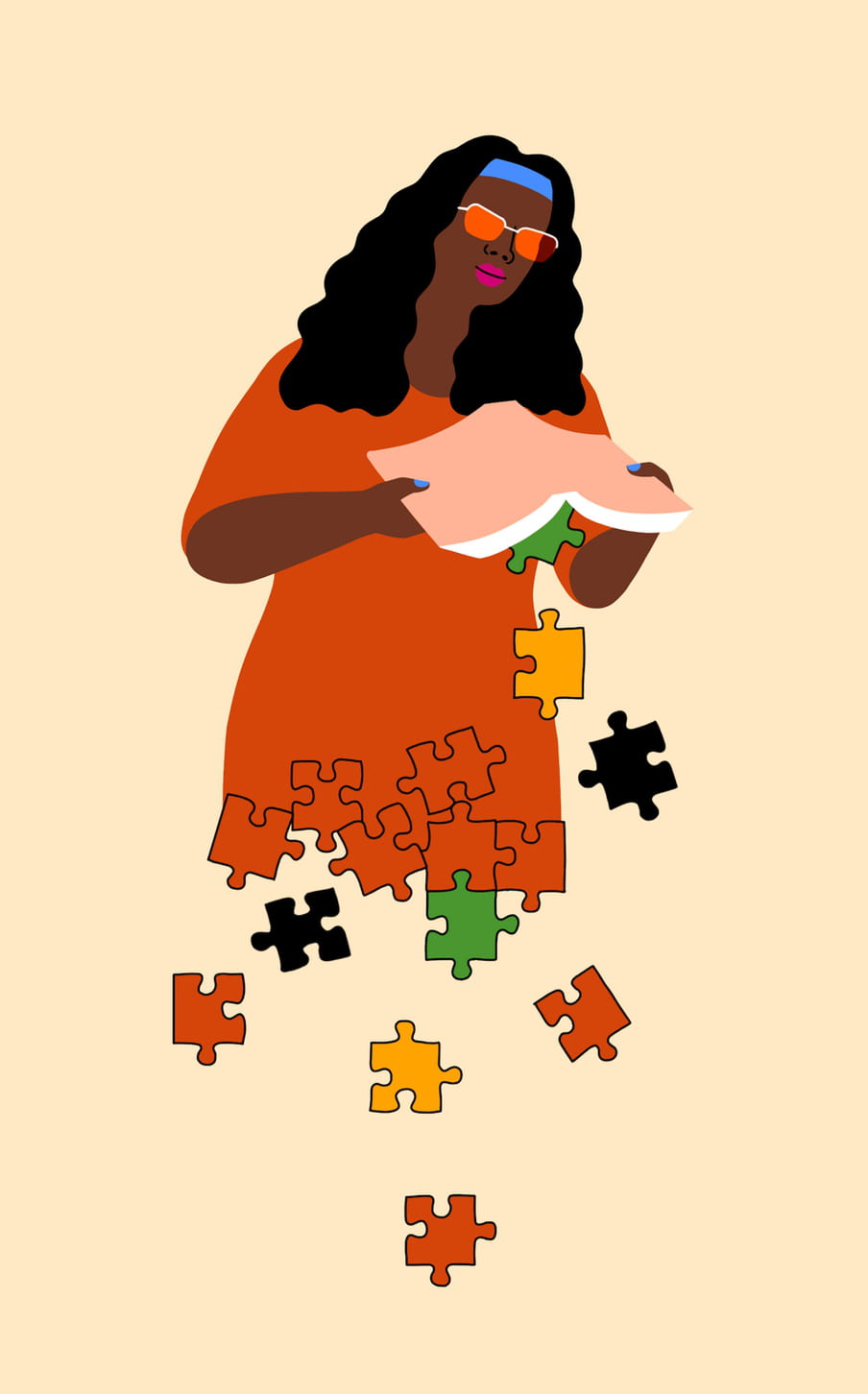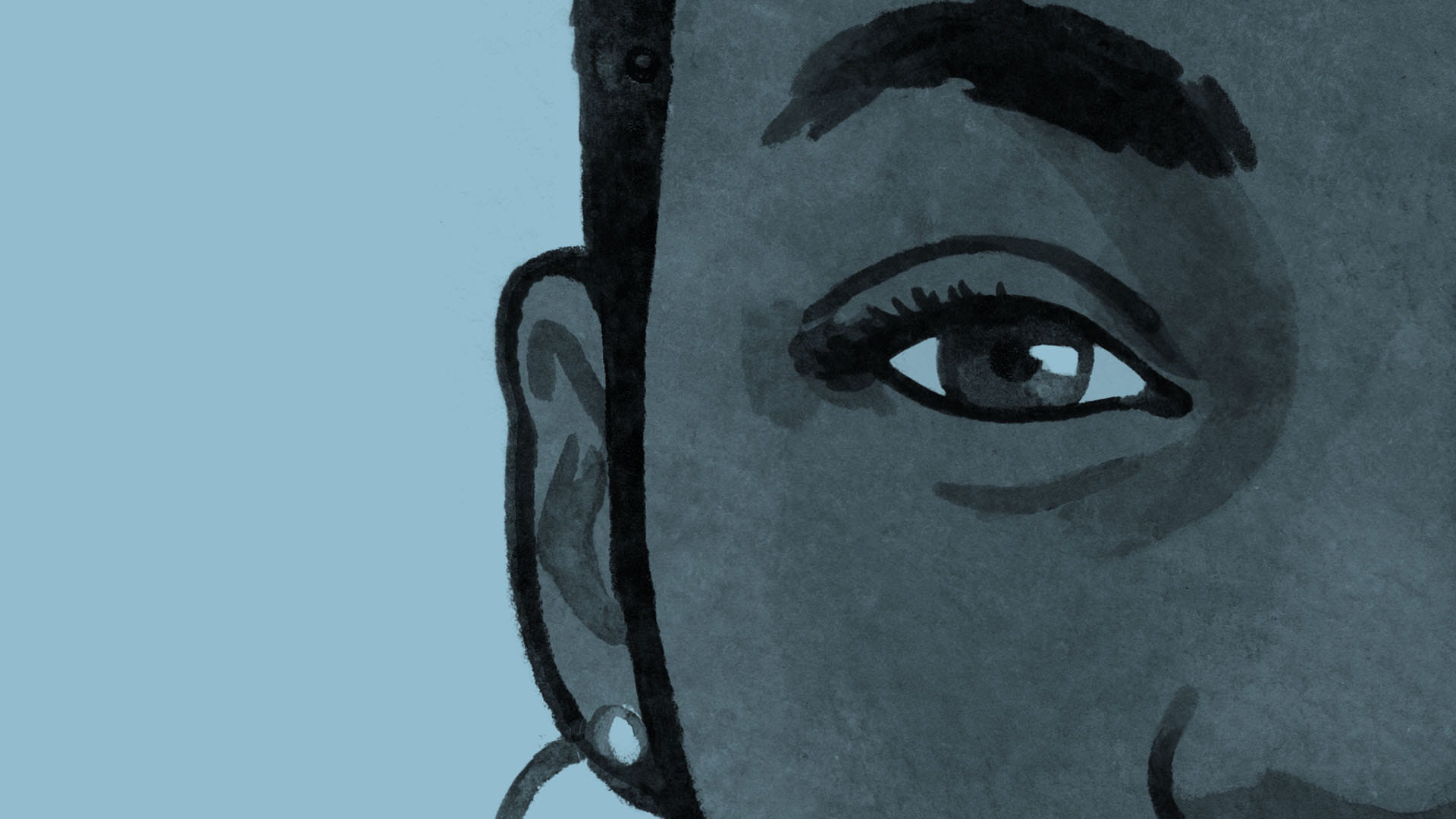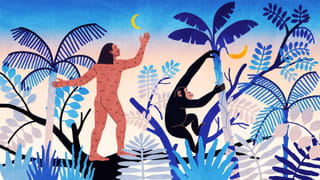Yuval Noah Harari’s hugely popular book Sapiens doesn’t say when human beings evolved the ability to laugh. It doesn’t need to – laughter serves no observable evolutionary purpose. Still, reading the book made me curious about why humans do it – as Sapiens made me laugh out loud several times, which I hadn’t expected at all.
When I chose to review Sapiens for my book club, I had one central question: is there room in this human history for a human like me, a queer African woman? Only a few pages in, I already had to grin at the extreme narrowness of my chosen line of inquiry.
Join us today to discuss this book on The Other Shelf, our online book club!
Most of the categories by which we define ourselves today are extremely new: nation states, race, sexual orientation and gender identity all emerged within the last 500 years. As the book convincingly shows, there is immense value in looking at human history from a much longer and broader perspective.
Harari’s perspective, described in the book as "a spy satellite’s view", zooms so far out that most individual humans are completely invisible. Instead of people, the book reveals patterns. And it does so in very wide ranging and original ways.
From the assertion that money, time and even human rights are the result of collectively held and fiercely defended delusions, to the hilarious argument that the only logical way to reconcile faith in God with the existence of evil is to conclude that God is bad, the book brilliantly inverts many beliefs and behaviours that are taken for granted. I’ve never seen the world presented the way Harari does, nor have I ever got this much enjoyment from the destruction of some of my beliefs.
A hefty history of humankind ... except Africans
But patterns are made up just as much by the details that are visible as by those which are left out – the gaps, if you will. While Harari does a truly phenomenal job of changing the way his readers see and interpret the patterns of human history, he fails, as perhaps most historians do, to pay attention to the gaps. Or, to put it another way: while Harari is groundbreaking and original in his view of the history he chooses to discuss, he’s almost equally unoriginal in his view of the history he leaves out.
Invisibility is not the same as erasure, of course, but the effects are hardly distinguishable. As a west African, I found myself wondering about the relative absence of sub-Saharan African actors from the pre-modern world stage illuminated by Sapiens. Once Harari was done expounding upon the widely accepted wisdom of East Africa as the "cradle of life" or "birthplace of humanity", this vast region largely disappeared from his view. As I read along, discovering astonishing human developments that took place in the distant past, I became eager to see my continent through new eyes. Alas, even in this revelatory work, we were mostly nowhere to be seen.
It isn’t the case that Africa did not play host to empires, scientific innovations or even socio-political miscalculations of note. The complex mathematical system known as fractals, on which the layout of the ancient city of Benin is based, could have been a valuable addition to the section of the book which considers the role of math and data in shaping human history. In the middle ages, Zanzibar was one of several Swahili coastal settlements to serve as key hubs of trade among inland African, Arab and Asian merchants. This would have been worth a mention in the sections that discuss the emergence of commerce, international cooperation and the global economy.
Africa’s place in modern history isn’t limited only to the enslavement and colonisation of its people, after all.
The difference between erasure and invisibility
That is not to say that the book fails to make its case convincingly. I found many of the arguments in Sapiens astounding yet uncomplicated. Harari posits, for example, that cereals and other cash crops domesticated humans, rather than the other way around. He upends the notion that the ecological destruction of our planet by human activity is an impending event, foregrounding all of the historical and ongoing extinctions that we have caused. In particular, he gives the lie to huge chunks of the science curriculum to which I was exposed as a schoolgirl, by explaining that various human species existed concurrently. I had no idea that we didn’t evolve in a straight line from Homo erectus to Homo sapiens, but apparently neither did my secondary school teachers.
Still, there were some sections where I didn’t enjoy Harari’s inclination towards cheeky inversions as much, nor the detached passive tone in which he tends to make his arguments. I don’t believe I laughed even once as I read his presentation of the large-scale impacts of European colonial conquest on other continents – at certain points, I even found it disingenuous. For example, Harari describes the many indigenous cultures in India as a "bewildering mosaic" who were united by empire under a "neutral tongue". To whom, I wondered, were these cultures bewildering, and how many people on Earth have the luxury of considering English – of all language – as "neutral"?

There’s nothing personal about all this, of course. Harari is careful to make neither definite value judgments nor political statements one way or another. However, my personal history as a person of Itsekiri and Ijebu ancestry exists within the broad and unqualified scope he chooses to gloss over.
It is possible to zoom out with Harari when reading about Neanderthals or hunter-foragers from millennia past. It isn’t so easy to do while knowing there are people in my bloodline whose violent and avoidable deaths were recorded only for accounting purposes. Especially while the descendants of those who survived continue to experience unconscionable violence for having the audacity to be alive.
Colonisation, violent settlement of indigenous lands, and chattel slavery were crucial to Europe’s and North America’s prosperity. So I was surprised by how briefly and almost glibly the book addressed these issues which, to my mind, are as fundamental to the modern era as the emergence of cities, the development of money, or the discovery of science.
What does it mean that a book of such heft – literally and figuratively – offers more detailed insights into the material, emotional and psychological suffering of hens and cows in industrial societies than that of the enslaved humans on whose backs the way was paved for industrialisation?
Harari glibly highlights the proximity of supply, and the immunity of Africans to tropical diseases, to explain that chattel slavery was first a capitalist pursuit before producing racist outcomes. But as I observed the effort and time he gave to expounding on human enslavement versus, for instance, the equally profit-driven exploitation of livestock, I found myself thinking, despite knowing better, that perhaps slavery wasn’t that momentous after all. It’s unpleasant to imagine the effect of this narration on people who might be more inclined to believe slavery was never that big a deal.
This is where the difference between erasure and invisibility becomes decidedly irrelevant: they both result in the same cognitive obscurity.
The problem of universals
Harari establishes that the glue that holds humanity together is not capitalism, nor world peace, nor even humanism, as many modern Sapiens would like to believe. It is cognition, or more specifically, imagination: the stories we tell, the inter-subjective myths we deploy to organise our societies, all the ways that we learn, remember and communicate. Exactly because of this, I wish that Harari’s own imagination had meaningfully transcended limits that are all too familiar to those of us who are accustomed to being left out of the story.
When Harari zooms in from his "space satellite" view, he does so to sketch the details of events, name people, and flesh out their actions. So I learned, for instance, the name, professional itinerary and leisure-time activities of the British officer who led the effort to decipher the Behistun Inscription. Meanwhile, the person whose nimble body made it possible to capture the most inaccessible parts of the cliff face where the Old Persian, Elamite and Babylonian script was written remains just "a Kurdish boy". Since Harari makes no remark about it, I can infer that he finds it unremarkable that history – including the one he has written – has so little to say of this boy whose agility and labour added so much to our understanding of three ancient civilisations.
Over and over again, I was struck by the brevity of Harari’s investigations into Africa. The universal "we" in his account of the rise of individualism shows no attempt to complicate the narrative by exploring how non-European or non-North American societies evolved a less direct relationship with the market and the state. His storytelling about Spanish soldiers’ devastation of the people and civilisations of South America was enlightening, but left me wondering: what if a native rather than a conquistador, Hernán Cortés, were at the centre of the narrative?
How you’ll know you’ve never been invisible
As this list of omissions grew, I felt the need to look through the citations in the back of the book. Running my finger down the tiny text filling the last few pages, I smiled wryly: of all 140 of Harari’s sources – academic texts, journal articles and news items – exactly one was by an African scholar.
There is a non-white woman who is named twice in Harari’s book. When he presents Truganini, immortalised as the last native Tasmanian on Earth, her body has been removed to Europe for scientific research. I found her photo deeply moving, and almost involuntarily turned her name over in my mouth a few times. It is striking that there’s no one alive who can confirm whether I was saying it right.
Several chapters later, Truganini shows up again at the end of a section so fantastical that I couldn’t have written it better myself. “When judging modernity,” Harari writes, “it is all too tempting to take the viewpoint of a twenty-first century middle-class Westerner. We must not forget the viewpoints of a nineteenth century Welsh coal miner, Chinese opium addict or Tasmanian Aborigine. Truganini is no less important than Homer Simpson.”
If this sentence doesn’t leave you deeply bewildered, then I reckon you’ve never had to ask yourself why you’re so invisible in the world. It makes absolutely no sense that the last survivor in a human population that was hunted and systematically rendered extinct should be juxtaposed with, of all things, the supporting character of a doltish dad from a television cartoon.
At least look me in the eye to tell me I’m unremarkable
Harari doesn’t judge modernity, but his perspective on it is suspiciously close to the type that he says we should resist the temptation to prioritise. For a book that argues convincingly that none of us are even remotely remarkable in the grand scheme of things, I was disappointed to spend several chapters feeling as though I am not deemed important enough even to be looked in the eye as I was informed of my unremarkable-ness.
Sapiens is a very accomplished book. Harari contextualises humanity in accessible, inventive and frankly invaluable ways. It feels unfortunate, therefore, that such a monumentally original work of historical non-fiction includes such shockingly traditional blind spots.
In reading Sapiens, I wanted a chance to challenge my preconceptions about what a self-described history of humankind might contain – or more pertinently, what it might not. I abandoned my original question, “Does this history have room for a queer African female human?” at the beginning of the book, but I’m afraid I still had my answer by the end.
 Want to receive my newsletter in your inbox?
Follow my weekly newsletter to receive notes, thoughts, and questions on the topic of Othering and our shared humanity.
Want to receive my newsletter in your inbox?
Follow my weekly newsletter to receive notes, thoughts, and questions on the topic of Othering and our shared humanity.
Dig deeper
 Tales from the border: rewriting the narrative of the anonymous migrant
Every year, hundreds of people die along the US-Mexico border. Government policy is deliberately deadly, dehumanising and erasing those who try crossing. Author Jason De León joined us to discuss invisible violence, immigration policy, and unexpected humour.
Tales from the border: rewriting the narrative of the anonymous migrant
Every year, hundreds of people die along the US-Mexico border. Government policy is deliberately deadly, dehumanising and erasing those who try crossing. Author Jason De León joined us to discuss invisible violence, immigration policy, and unexpected humour.
 Quiet Pride
There are valid concerns to be raised
Quiet Pride
There are valid concerns to be raised about the value of promoting US ideas like Pride marches or "loud and proud" visibility to people who live in repressive contexts. But joy, much like the Sisterhood of the Bathroom Sink, is truly universal. So too is the desire for dignity and affirmation.


